- Home
- Sam Siciliano
The Angel of the Opera Page 12
The Angel of the Opera Read online
Page 12
Six
Although several people were injured in the press of the panic-stricken crowd, there was only one fatality: that somber, stubborn-looking woman dressed in black whom I had noticed. She was Monsieur Firmin Richard’s concierge and the person whom the managers had chosen to replace Madame Giry as box keeper. We discovered this fact the next afternoon when the managers reemployed Sherlock Holmes at one thousand francs a day. Richard was subdued, if not exactly penitent. They had also decided to pay the Phantom, rehire Madame Giry, and replace Carlotta with Christine Daaé.
Holmes nodded his approval, then said this was already proving to be one of his most difficult cases; they must resolve to be patient. Richard bit at his tongue, while Moncharmin’s head bobbed up and down. Moncharmin told us that Monsieur Mifroid, the Superintendant of Police, would be investigating the prior night’s disaster.
Holmes’s mouth twitched. “Monsieur Mifroid is an individual of minimal intellectual capabilities with an almost total lack of imagination. I could name you a half dozen better men, but Monsieur Mifroid does excel in self-promotion. He also has certain connections which allow him to choose his work. No doubt the notoriety provided by the falling chandelier has brought the Opera to his attention. You would do well to tell him as little as possible. Now, I have one or two requirements to bring to your attention.”
Moncharmin’s blue eye peered through the circular glass. “Yes?”
“I shall want to interview Mademoiselle Daaé again as soon as possible and...”
“Alas...” moaned Moncharmin.
“What is the matter?”
“The young lady has vanished,” Richard said gruffly.
“However, she did assure us that she would be available for La Juive a week from this coming Saturday.” Moncharmin wiped at his forehead with his handkerchief. “And for Faust the week after that. Thank God!”
Holmes tapped at his knee. “And when did she tell you this?”
“Last night,” Moncharmin said. “After the catastrophe.”
“You spoke to her then?” My surprise must have been evident.
“Oh yes, Doctor Vernier. Firmin dealt with the police and the crowd, but I went to find Miss Daaé. Carlotta was clearly indisposed, and we needed a singer to ensure the season’s continued success.”
“Of course,” Holmes said rather dryly. “Tell me, sir, how did you find the young lady? How would you characterize her mood?”
“She was most distraught, Monsieur Holmes, most distraught. Her countenance was very pale, and I feared she might faint. She and Carlotta were not always on the best of terms, but that dreadful sound... Mademoiselle Daaé said she would not wish it on anyone, and then the chandelier’s falling...” Moncharmin’s voice quavered.
“Yes, yes, a veritable tragedy, all the more so since it might have been avoided.” Neither of the managers would meet Sherlock’s cold gaze. “But she did assure you that she would carry the rest of the season for you? Ah, I thought so. Well, how exactly do you know that she has vanished?”
“The Viscount was looking for her this morning,” Richard said. “He assured us she was not at home. We sent one of our assistants with him, but they could not find her in her dressing room or any of her usual haunts.”
“Where else might she have been?” Holmes asked.
“She likes to watch the stagehands at work on the sets and the young dancers, the children. Of course, since it is Sunday, very little is going on.”
“You do not think”—Moncharmin’s voice was still trembly—“she could not have disappeared for good? She would not miss La Juive!”
Holmes shook his head. “I am certain she will return before then. Rest assured, she will not miss her engagement.”
Moncharmin gave a great sigh. “I never imagined that managing an Opera House could be such a wretched business.”
Richard placed one paw of a hand over the other; his fingers were red and thick, the span of his knuckles enormous. “What were your other requirements, Monsieur Holmes?”
“I suppose speaking with Madame Carlotta would not be possible?”
Moncharmin shook his head quickly. “No, no, not at this time. She will not see anyone, not even us. Her manager says she has had a great shock and is under her physician’s care.”
“I also wish to spend more time wandering about the Opera.”
Moncharmin held his head stiffly like a small bird. “You do not, of course, wish to explore the cellars beneath the Opera?”
“I intend to do just that.”
“But it could be very dangerous! Everyone says... No one goes down there alone.”
“Oh, I shall not be alone.”
“No?”
“Doctor Vernier will accompany me.”
With both of the managers regarding me, I managed a feeble smile, but a queasy sensation manifested itself directly below the center of my rib cage.
Holmes stood and pulled on his gloves. He took his hat, then hesitated. “Tell me, gentlemen, did anyone notice anything out of the ordinary last night?” A bark of laughter escaped from his lips, then he laughed in earnest while the managers stared at him as if he were mad. “Forgive me, but the absurdity of my question suddenly struck me. I mean other than Madame Carlotta’s indisposition and the falling chandelier.”
The two men regarded each other. Moncharmin said, “No, Monsieur Holmes, not that we are aware of.”
“I doubt anyone would have noticed anything in such chaos. Good day, gentlemen.” We started for the door.
“Oh, there was one thing, hardly very important.” Moncharmin smiled warily. “The prompter was quite drunk, something which has never occurred before. He is usually most scrupulous, but last night...”
Holmes hunched slightly, his eyes bright. “Drunk?”
Richard nodded. “How else could you explain his sleeping in a corner amidst all that uproar? I could hardly wake him, and he smelled awful. I was ready to fire him, but Armand...”
“Really, Monsieur Holmes, it was the first time. I did speak to him severely and told him any reoccurrence would lead to his summary dismissal.”
“And what was his reaction to your generosity?”
“He tried to deny it, but I would not hear any of his excuses.”
“Most interesting. Please keep me informed of any developments.”
Again a brooding, gloomy silence hung about the vast, empty edifice, the contrast striking after last night. The Phantom had given the Opera a sinister aura; for the first time I wondered if he might not be hiding close by, watching from the shadows; and even the gaudy opulence of the grand stairway seemed threatening. I was relieved to reach the open air outside.
“Were you serious,” I asked, “about wandering the lower cellars?”
“Come, Henry, you know me well enough to answer your own question. If you are uneasy, you need not accompany me.”
“Uneasy or not, I certainly cannot allow you to descend alone to that underworld. You heard Moncharmin.”
“I have put myself in far greater danger.”
“That hardly matters. If you think that I could loiter about the hotel while you are risking your neck down there, you are quite mistaken.”
“Henry, I did not ask you to accompany me in the capacity of bodyguard.”
“Nevertheless, I cannot let you go alone.”
“The choice is entirely yours.”
I muttered a curse under my breath. We had been in Paris nearly two weeks and had nothing to show for our time. Michelle had not asked me not to accompany Sherlock on this trip: she was far too clever for that! No doubt she foresaw that I would soon be missing her. Male companionship was fine for a short period of time, but I had begun to tire of its triviality. Already I had sensed with Michelle the possibility of a genuine intimacy. Not only was she witty and intelligent, but she was quite beautiful. I would have given anything to have her waiting for me back at the hotel.
“Perhaps you are thinking of Michelle,” Holmes said.
>
I stopped walking abruptly and stared at him. “How the devil...? Have you now taken up mind reading? Is the privacy of my own thoughts to be denied me?”
He laughed. “No, no. It was not mind reading, nor any grand trick of logic. You have told me she is much on your mind, and I have noted your tendency to gaze into the middle distance, oblivious to the surroundings. The symptoms are all too common.”
“Regardless, it is very annoying.”
“You are discouraged,” he said.
“Yes, I am. I was thinking we have precious little to show for our time here.”
“To the contrary, I understand our opponent quite well. The problem now is to devise a stratagem to render him harmless.”
A cab passed us in the street, the horse’s iron shoes clopping evenly on the pavement. Late Sunday afternoon was among the quieter times in Paris.
“Do you mean you understand that mysterious business of last night? Even I am beginning to wonder if the Phantom does not have supernatural powers.”
“Nothing occurred last night which would require supernatural powers.”
“How then did the Phantom cause Carlotta to make such a dreadful sound? It did seem the manifestation of a curse.”
Holmes smiled, his expression gentle, yet triumphant. “Carlotta did not make that sound.”
“What?”
“You heard me. Be patient a while longer, but be assured that we are not dealing with any ghost. Le Fantôme is real enough, and he has dwelt in the Palais Garnier since its construction. Our difficulty lies in tracking him through such a vast maze. The Opera itself would be formidable enough with its seventeen floors, its hundreds of doors, its many rooms, attics, and closets, but I fear there are hidden passageways connecting everything, a labyrinth within a labyrinth.”
I wanted to ask more questions, but he put me off. The next few days found us again exploring the Opera, especially its lower depths. The managers provided Monsieur Gris as our guide, much to his displeasure. He again offered a bit of “precious advice,” holding up a calloused hand alongside his face. “Your hand at the level of your eyes, Messieurs, as you value your life.” He looked about, then whispered, “The Punjab lasso.”
“What foolishness!” I exclaimed, but again Holmes and he relentlessly pestered me. By the end of the day I was in a foul temper, both my arms sore.
We saw nothing but damp gray stone, dusty sets and props; we climbed up and down narrow stairways, trudged through dark corridors and vast rooms, and heard only the occasional scuttle of rats or roaches fleeing our approach. Soon I grew heartsore, then afraid, a vague, amorphous dread settling about me like a somber cloud. When we finally came above ground and stepped outside, I blinked at the bright light, even as some mole coming up from its hole.
The Viscount appeared at least twice a day and implored Holmes to search for Christine Daaé. Sherlock always refused, assuring him that she was well and that she would reappear in time for La Juive a week from Saturday. The Viscount responded with either rage or tearful despair, both of which were equally tiresome.
“How can you be so certain she will return?” I asked Holmes one day.
“The Angel of Music is her guardian angel. He did not bring Carlotta and the managers to their knees only to snatch Christine away forever. She will return for her night of triumph in the limelight.”
And indeed, he was shortly proven right. On Friday, at the end of a long week of wanderings through the Palais Garnier, broken for me by Holmes’s time spent perusing plans and documents in the Opera library, the Viscount appeared with a note that had been found on the street and delivered to him. Christine Daaé requested that he meet her at a masked ball that was to take place at the Opera the next day. He was to come dressed as a Pierrot. “As you value your life, dearest, make sure no one can recognize you.”
Holmes told the Viscount we would accompany him. I could not help but notice a childish delight in my cousin, the explanation of which soon became clear. He dearly loved disguises!
The Opera Ball, which occurred shortly before Shrovetide and the beginning of Lent, was a Paris ritual, a bacchanalia that attracted both the youthful occupants of Bohemia, that subculture of painters, musicians, poets, and writers residing near Montmartre, and the upper classes, who came to watch the show and display the finery of their own costumes. As a result, I soon discovered that finding a costume to rent or buy was impossible. I spent Saturday morning vainly visiting shops. I was on my own, since Sherlock had devised something for himself that was a great secret.
When I returned dispirited to the hotel, there on my bed were a black robe, a long staff with a reaper’s blade at the end, and a mask with the visage of a skull.
“Where on earth did you find them?” I asked Holmes.
“The Opera, of course. They have hundreds of costumes, as you no doubt recall. I managed to prevail upon the wardrobe master’s generosity.”
I felt extremely stupid not to have thought of this myself. A huge chamber had been filled with row after row of costumes. Holmes still refused to reveal his own costume.
We ate an early supper, and since the ball did not begin until late, I lay down briefly. I rarely sleep during the day, but as the past week and the morning’s quest had been exhausting, I was soon fast asleep. I began to dream about the ball and the Opera, then remembered that I needed to wake up and dress. By some curious act of will, I managed to pluck myself from my dream, opening my eyes and discovering a frightful vision. With a cry, I staggered to my feet.
Before me stood a deformed hunchback, his red hair a tangled mess, broken teeth protruding from his swollen upper lip, his face horribly mangled and twisted, completely lacking in symmetry. A large mole covered one eye, rendering him half blind; and his smile was grotesque, hideous, his clothes completely black. The thought struck me that this must be the Phantom, come at last to pay us a visit. No wonder he hid himself in darkness!
“Good God,” I murmured, but then the Phantom laughed.
“Sherlock!” I shouted. “This is impossible! You go too far!”
“Henry, I did not know you would choose to wake up at this particular moment. It was unintentional on my part, I assure you.”
“Unintentional, my foot! I’ll wager you have been lurking there for the past hour just waiting for me to open my eyes!”
“No, no.”
“The truth, wretch!”
“Well, five minutes perhaps.”
My fear had abated, and I knew I had been fairly bested. “I owe you one for this. I shall have my revenge.”
“You had a most curious expression on your face.”
“Villain! To think that the great Sherlock Holmes would stoop to frightening innocent sleepers. You look quite remarkable. No one would recognize you. I assume that is putty on your nose and cheeks.”
“Correct.” His voice was garbled, and he reached into his mouth and withdrew his front teeth. “That is better. Talking for any length of time is awkward.”
“You are, I assume, Quasimodo, the Hunchback of Notre Dame.”
“Very good. What better tribute to Hugo and the city of Paris?”
“There may be other hunchbacks at the Opera, but none will be half so frightful.”
“Thank you, Henry.”
Indeed, the Viscount stepped back when he saw Quasimodo-Holmes, murmuring, “My God.”
“Pay him no attention,” I said. “You are only flattering his vanity.” The Viscount appeared ill at ease and somewhat ludicrous in his white clown suit with the black buttons, pointed white hat, and mask. The mask hid most of his face, curving over the mouth so that only his chin and lower lip showed. “Where on earth did you find your Pierrot costume, Monsieur le Vicomte?”
“I had it made,” he replied coldly.
“It suits you remarkably well,” Holmes said, his mouth distorted by the teeth.
The Viscount’s mask hid his expression, but I could see in his eyes that the remark did not please him.
The evening was cool, not cold, late February giving us a preview of the Parisian spring to come, and the Place de l’Opéra teemed with people laughing or talking and dressed in outlandish costumes. The grand stairway itself was virtually impassable. Several clowns cried out to the Viscount, greeting him as an old friend, and the young ladies, some in scanty costumes (an Arabian princess with naked midriff, a Greek goddess whose flimsy robes left both shoulders uncovered, an Amazon warrior with bare legs), welcomed him. However, he behaved in a decidedly un-Pierrot-like fashion, forging coldly ahead. Holmes and I had a more sobering effect on the revellers; indeed, Holmes’s face opened up the crowd before us even as Moses parted the Red Sea. One woman cried out, “Quasimodo!” but she kept her distance.
A young blonde in a black silk gown made way for Holmes, then seized my arm. She held a glass of champagne in her slim white hand. “‘Death, where is thy sting?’” she said in heavily accented English. Then in French, “What have you to show me under those robes?” She wore a black mask that revealed most of her pretty face, and her gown was scandalously low cut, the white curve of her breasts apparent as she leaned toward me, swaying slightly.
The desire I felt embarrassed me; I wished again that I could hold Michelle in my arms. “Bones,” I replied.
“One bone only delights me.” She gave a drunken laugh, and then a swarthy man in a turban with fierce black eyes and mustache pulled her away, cursing me.
“No one respects the Reaper nowadays,” I said.
We finally reached the top of the stairs, where our Viscount Pierrot awaited us. “She was to meet me before Box Five.” The Viscount shuddered involuntarily as he glanced at Holmes’s face.
“Yes, I had not forgotten that.”
“Grant me a few minutes with her alone. Then I shall try to divert her to a place where you can overhear our conversation.”
“That will be difficult in this din,” I said.
He shrugged and headed for Box Five. Behind us the crowd suddenly quieted, even the oaths of exclamation having a hushed quality. Turning, I saw ascending the marble stairs Death himself. The apparition was so frightful that it took me a moment to recognize this particular manifestation. “The Red Death,” I whispered.

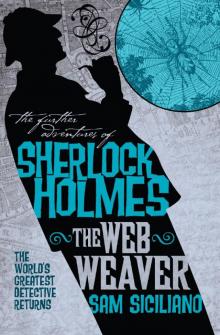 The Web Weaver
The Web Weaver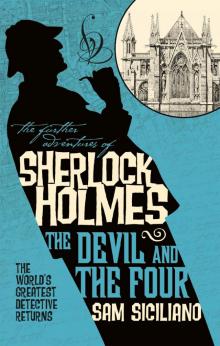 The Further Adventures of Sherlock Holmes--The Devil and the Four
The Further Adventures of Sherlock Holmes--The Devil and the Four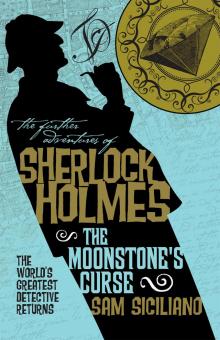 The Moonstone's Curse
The Moonstone's Curse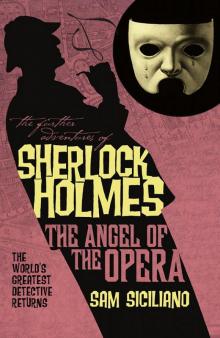 The Angel of the Opera
The Angel of the Opera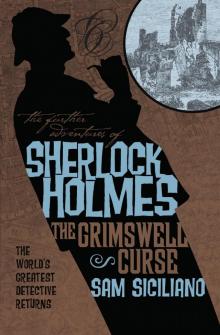 The Grimswell Curse
The Grimswell Curse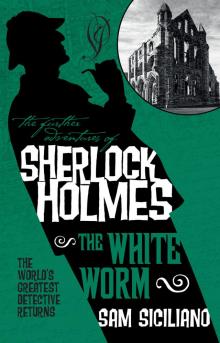 The White Worm
The White Worm